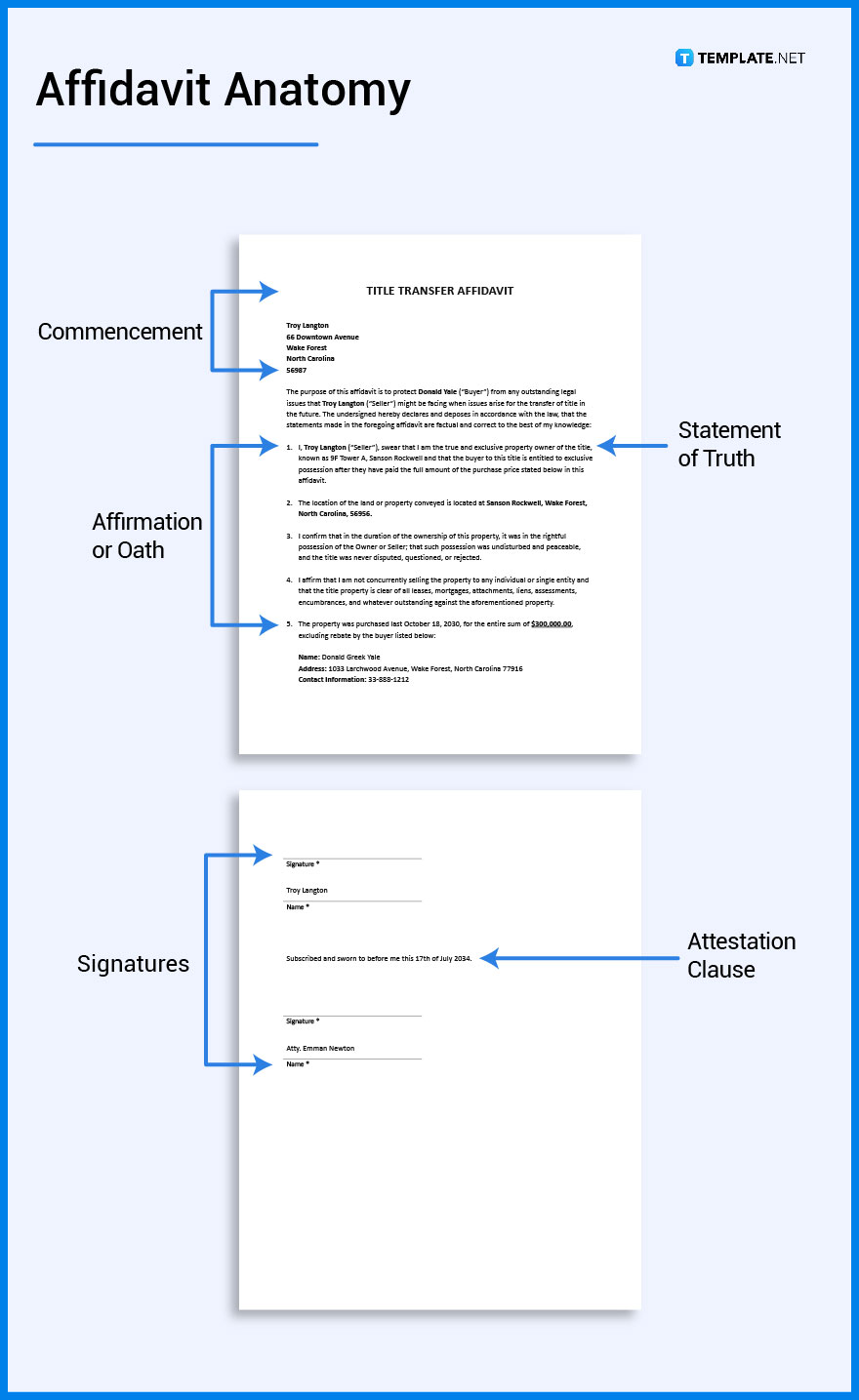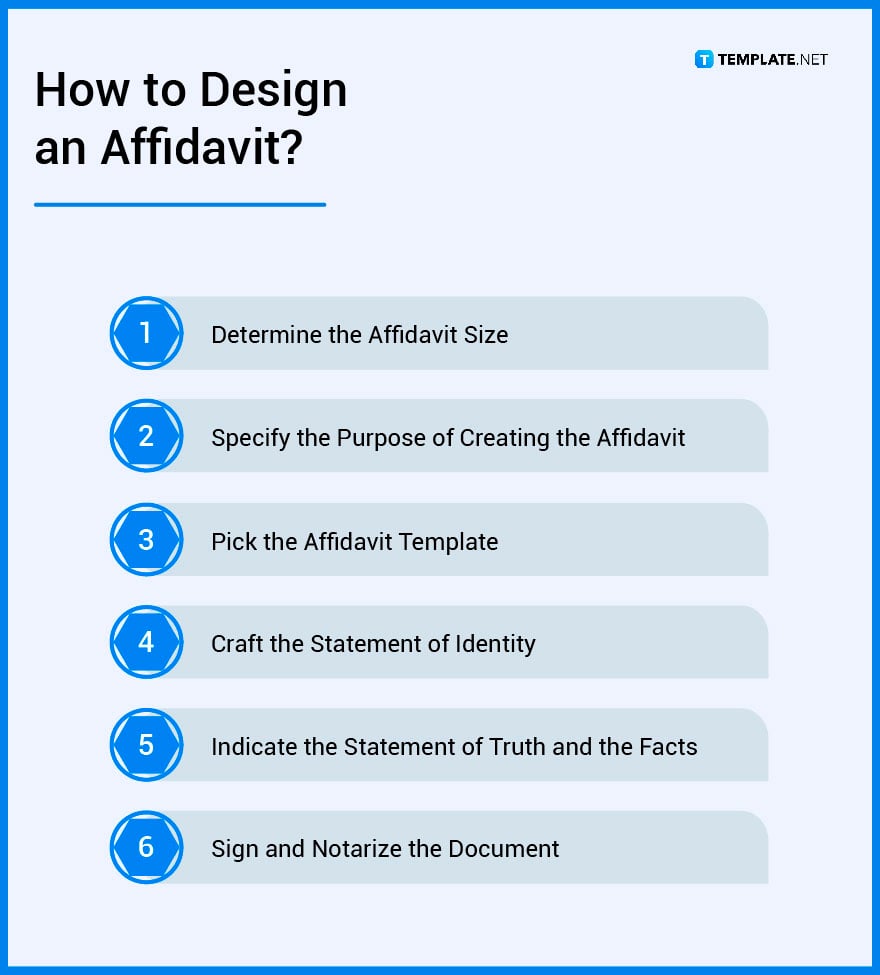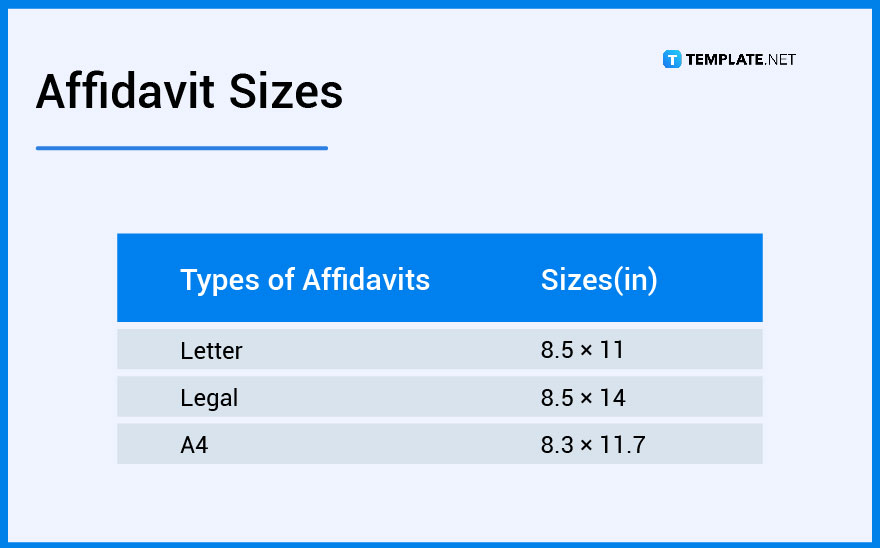![How To Create Meeting Minutes in Google Docs [Template + Example]](https://images.template.net/wp-content/uploads/2023/07/How-To-Make_Create-Meeting-Minutes-in-Google-Docs-Template-Example-788x443.png)
How To Create Meeting Minutes in Google Docs [Template + Example]
Meeting minutes Play a vital role in the recording of meeting information and details. In any kind of meeting, there is always…
Apr 21, 2023
Affidavits are written sworn statements by individuals under oath to say only the truth when testifying in a court of law. They are legal documents that people use in any legal court proceeding or negotiation.

An affidavit is a sworn statement in writing that individuals observe under oath before an authority, either a magistrate or an authorized officer.
These affidavits come with witness statements to prove the truthfulness of claims, reports, and information in a court of law.
Affidavits are legal documents that must be notarized and signed in the presence of a witness, and an affiant swears that the affidavit contents are true and correct. In signing an affidavit, the disclosure of the affiant asserts that they have personal knowledge of the facts and that they are competent in testifying in court as part of the evidence. Courts can use affidavits in federal, civil, or criminal cases, including family law and bankruptcy.
Company affidavits are certified and legal documents wherein the court requires a business to transfer and present its company records for court proceedings. There are various company affidavits that an organization produces, including an affidavit of a lost promissory note that indicates critical information about a loan, time of the effectivity, and its complete value, and an affidavit of service or proof of service that records the date, time, and manner of service for legal transactions. Producing company affidavits heightens security and lessens the occurrence of fraudulent activities.
Individuals use legal affidavits to legitimize and protect a person’s claim over property, financial assets, cars, custody, markets, and many others. Legal affidavits are well-formatted and well-structured documents for a legal purpose and must have clear and concise content to make them understandable and serve their purpose. There are various legal templates that different institutions, groups, and individuals can use, including a citizenship affidavit, an affidavit of support for foreign passport visitors, and a residency affidavit to prove a person is a resident of a specific area.
Creating a rental affidavit provides a legal distinction and basis for a tenant and landlord relationship. The affidavit already serves as a formal and binding document to prove the validity and enforceability of a rental agreement and to help solve the possible disputes that arise during the agreement term. The record aids in investigating late fees, residential taxes, and other conflicts regarding the rental agreement.
A tenant affidavit covers a legal document that tenants and landlords can utilize for clearing misunderstandings or presenting evidence in a court of law. An individual can use an affidavit to certify made payments from tenant to landlord, address an illegal eviction claim, or initiate complaints from either party. When crafting a tenant affidavit, ensure that the affiant writes in the presence of a commissioner or notary public.
Financial affidavits are valuable documents that individuals use to prove the amount of money they currently have, including a checklist of their income, debts, liabilities, expenses, taxes, and other financial information and commitments. Financial affidavits are essential documents in communicating divorce and child custody for parents. Businesses use financial affidavits to grant loans and sales, reflecting whether a company is financially healthy for investments.
Gift affidavits are written and sworn statements that serve as formal proof for transferring ownership of a property from a donor and not a loan or sale. Individuals require writing the gift affidavit, especially if the property costs a lot of money or something unusual to give away. It helps the defendant or victim of an accusation to prove that the property acquisition is a legitimate transfer.
A birth affidavit is a legal document that seeks to prove an individual’s birth by verifying the facts surrounding the event, including the date, location, and the parents’ name. The individuals writing the affidavit are often blood relatives or someone who witnesses the delivery firsthand. An affidavit of birth is necessary when the birth record is incomplete or applying for a job or official documents like visas or Green Card.
Complaint affidavits are written documents representing sworn statements when filing a legal complaint in a court of law. An individual can file an affidavit against a person for violating civil law or a criminal case through a formal complaint with the aid of law enforcement. The document then becomes the basis of the case, providing general information about the event, and outlining the nature of the case.
Employment affidavits are sworn statements in writing that contain verification of a person’s employment in an organization. Individuals submit the affidavit as a supporting document to prove they have a stable revenue stream to apply for loans or mortgages. The affidavit comes with pay slips, bank statements, and company information, including phone and fax numbers.
A marriage affidavit is a legal document of a sworn statement that spouses submit to a court and other institutions as verification that two people are married. The affidavit can be a viable substitute for a marriage certificate that the government provides. Couples use the affidavit of marriage to communicate child custody, divorce, or a requirement for a student’s online enrollment, according to the school code.
Individuals can write affidavits for various purposes. Many government agencies and transactions require persons to submit affidavits, including license applications, vehicle registrations, operation permits, etc.
One of the primary uses of affidavits is individuals acquiring one for court use, involving witnesses appearing in court cases to provide oral statements instead of an email or letter. People use the affidavit in court proceedings to support written statements. An entity can also provide an affidavit in case a witness cannot appear during a trial or hearing.
An affidavit is also useful for preparing for a will. Writing a will requires two witnesses during the writing with these witnesses testifying in court to make the document valid and enforceable. However, creating an affidavit makes the will valid and enforceable without the witness testimonies to prove its validity.
Affidavits usually come as attachments with other vital documents like witness statements or dispute evidence. For affidavits to be valid, the person writing the document must be aware of the facts according to their knowledge of the event, stating only facts or truths. Make sure to present a notarized affidavit to court hearings.
The proper use of affidavits can be a means to influence court decisions. Individuals can also use affidavits to certify facts and information about the lives of the involved parties. The document serves as a way to justify and deliver certifiable facts that are reasonably truthful.
Affidavits are admissible evidence, while some courts require the affiants to testify to avoid deeming the content as hearsay. Prepare to testify in court as a witness if the court does not exempt an individual as a court witness. In most cases, the affidavit serves as evidence together with the individual testifying.
The commencement section offers the title of the affidavit. It also contains the identification of the affiant at the beginning of the document.
Affirmations, oaths, or averments are earnest assurances about the deponent’s actions in the document. It lists all of the claims from the affiant, according to their knowledge of the event.
A statement of truth is a short declaration that states everything in the affidavit is true. Most statements of truth follow the phrase, “I solemnly swear that the aforementioned information is true and correct to the best of my knowledge.”
The attestation clause is the section of the affidavit where the affiant becomes certified. The attestation clause also contains the certification date.
The last section of the affidavit must contain the signature of the affiant and the witness. Only after can the affidavit be notarized.

1. Determine the Affidavit Size
2. Specify the Purpose of Creating the Affidavit
3. Pick the Affidavit Template
4. Craft the Statement of Identity
5. Indicate the Statement of Truth and the Facts
6. Sign and Notarize the Document

An affidavit is a legal and notarized document that is an attachment to an oath or affirmation before a court officer or notary public, true to the knowledge of the affiant.
Statements are prevalent in court proceedings for different purposes, including patent registration, business name changes, and criminal cases that do not follow a clear sequence of events.
Affidavits are written statements of facts that a person swears in front of a legally authorized entity and a notary public.
Declarations are subject to legislative provisions with the signature of the person present in the document without a witness or authentication of a commissioner.
An oath is a promise to perform or not perform an action, and in the case of a court proceeding, an individual oath to say the truth.
Affidavits are legal documents that have a standard format and structure that courts adhere to, and the individuals constructing the affidavit must follow. There is a specific affidavit size that the law accepts, following the list of paper sizes below.

Since affidavits have a wide range of uses, there are different instances in that individuals can utilize the legal document to support legal proceedings. The list below shows more affidavit ideas and examples that a company or individual can use for digital advertising or social media hearings.
An affidavit that individuals can use for immigration purposes in the United States is the affidavit of support.
The affidavit of support, otherwise known as Form I-864, is a legal document that an individual signs to accept any financial responsibility covering the applicant who is coming to live in the United States.
When writing an affidavit, it is necessary to determine the type of affidavit, location of filing, incorporate general information, create an attestation, evidence list, statement of truth, affiant signature, and notary.
A notary affidavit, or notarized affidavit, contains a written statement that a court hearing or procedure requires without the presence of an original document that confirms the facts of an event.
A person can get an affidavit by writing and notarizing a statement of truth in the presence of a witness or commissioner.
Courts require affidavits to certify or affirm the situation of the involved parties in a case or ruling, confirming if their statements are true and influencing court decisions.
Affidavits that are not notarized can still function in particular jurisdictions that do not require individuals to have a notarized affidavit.
The rule of the affidavit or the judicial affidavit rule states that instead of conducting direct testimonies in court, attorneys and lawyers can submit answers of witnesses under oath to the court.
The production of an affidavit certificate follows administrative procedures in verifying the existence of state affairs, with the signature of the individual and a warning that falsified statements in the document have legal consequences.
There are more than 20 types of affidavits that individuals can create and use to support court discussions and other documents.
![How To Create Meeting Minutes in Google Docs [Template + Example]](https://images.template.net/wp-content/uploads/2023/07/How-To-Make_Create-Meeting-Minutes-in-Google-Docs-Template-Example-788x443.png)
Meeting minutes Play a vital role in the recording of meeting information and details. In any kind of meeting, there is always…
![How To Make/Create a Manual in Google Docs [Templates + Examples] 2023](https://images.template.net/wp-content/uploads/2023/07/How-To-Make-Create-a-Manual-in-Google-Docs-788x443.png)
Manuals are essential instructional and reference guides. They help direct and inform an individual’s actions and also explain how to…
![How To Make/Create a Manual in Microsoft Word [Templates + Examples] 2023](https://images.template.net/wp-content/uploads/2023/07/How-To-Make-Create-a-Manual-in-Microsoft-Word-788x443.png)
Creating a manual can be a time-consuming and tedious task. However, manuals and other reference guides are necessary for organizations…
![How To Create a Legal Document in Google Docs [Template + Example]](https://images.template.net/wp-content/uploads/2023/07/How-To-Make_Create-a-Legal-Document-in-Google-Docs-Template-Example-2023-788x443.png)
When creating a legal document, there are a lot of things a person has to consider, and one of which is the…
![How To Make/Create a Contract in Microsoft Word [Template + Example] 2023](https://images.template.net/wp-content/uploads/2023/07/How-To-Make_Create-a-Contract-in-Microsoft-Word-Template-Example-2023-1-788x443.png)
Contracts can come in different forms and for different reasons but the most common thing is that when a company does business with…
![How To Create a Contract in Google Docs [Template + Example]](https://images.template.net/wp-content/uploads/2023/07/How-To-Make_Create-a-Contract-in-Google-Docs-Template-Example-2023-Step-788x443.png)
Contracts are an important part of any company or business, especially those that work with different companies or businesses. Companies…
![How To Make/Create a Report in Google Docs [Templates + Examples] 2023](https://images.template.net/wp-content/uploads/2023/07/How-To-Create-a-Report-in-Microsoft-Word-788x443.png)
A report is a comprehensive document that covers a wide array of topics from finance, research, incidents, feasibility studies, and…
![How To Make/Create a Report in Microsoft Word [Templates + Examples] 2023](https://images.template.net/wp-content/uploads/2023/07/How-To-Make_Create-a-Report-in-Microsoft-Word-Templates-Examples-20232-788x443.png)
A report is a document that contains information, data, analysis, finding, and other relevant information based on a specific topic.…
![How to Make/Create a Notebook in Google Docs [Templates + Examples] 2023](https://images.template.net/wp-content/uploads/2023/07/How-to-Make_Create-a-Notebook-in-Google-Docs-Templates-Examples-2023-788x443.png)
Notebooks always come in handy in writing important information or expressing our thoughts through written words. When we need a…